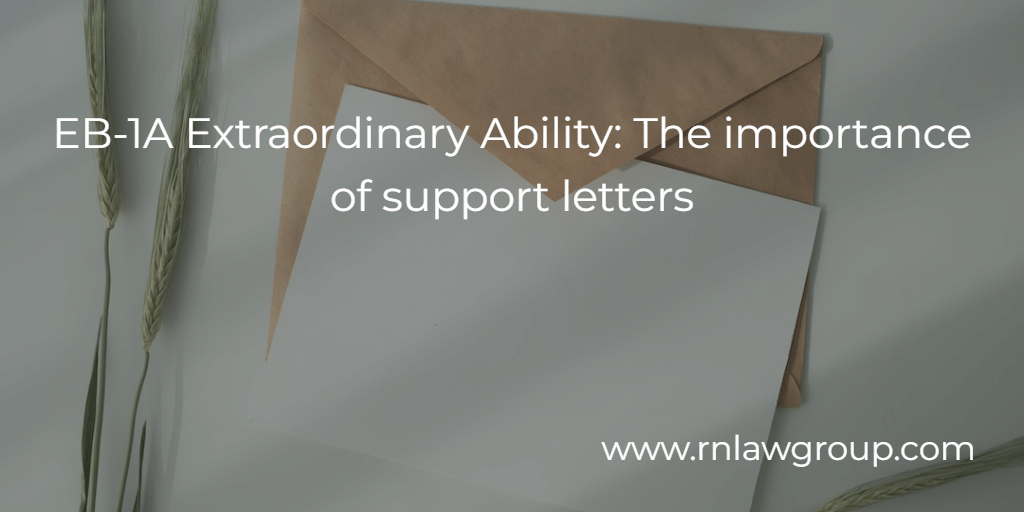
EB-1A Extraordinary Ability: The importance of support letters
The EB-1A employment-based immigration visa can appear to be a daunting process. An applicant must either show proof of a one-time achievement (major internationally-recognized award) meet 3 of the 10 listed criteria:
- Evidence of receipt of lesser nationally or internationally recognized prizes or awards for excellence
- Evidence of your membership in associations in the field which demand outstanding achievement of their members
- Evidence of published material about you in professional or major trade publications or other major media
- Evidence that you have been asked to judge the work of others, either individually or on a panel
- Evidence of your original scientific, scholarly, artistic, athletic, or business-related contributions of major significance to the field
- Evidence of your authorship of scholarly articles in professional or major trade publications or other major media
- Evidence that your work has been displayed at artistic exhibitions or showcases
- Evidence of your performance of a leading or critical role in distinguished organizations
- Evidence that you command a high salary or other significantly high remuneration in relation to others in the field
- Evidence of your commercial successes in the performing arts
These criteria can make even very well qualified candidates nervous about their eligibility, but with the right experience, the right lawyer, and a little luck, an applicant can have their Green Card in as little as three months. This series of articles will provide a background on each of the 10 criteria, examples of documents that can meet them, and common pitfalls to avoid.
With regard to obtaining an EB-1A visa, the assistance of professionals and respected people can significantly change the outcome. The EB-1A visa category, commonly known as “Alien of Extraordinary Ability,” is intended for people who excel in a particular profession and have remarkable talents and accomplishments. The significance of support letters in EB-1A petitions will be discussed in this article, along with how they can considerably improve a candidate’s prospects of receiving this highly sought-after visa.
How to Prove Your Extraordinary Ability
Supporting letters are essential in proving an applicant’s claim of exceptional talent. Candidates must show sustained national or international acclaim that is greater than that of their peers in order to be eligible for the EB-1A visa. Support letters written by professionals in the applicant’s industry are quite important in establishing this differentiation.
People with a solid reputations in the industry and those who are well-respected in the industry should write these letters. They ought to emphasize the applicant’s accomplishments, contributions, and effects in their field of specialization. References from respected academics, companies, peers, or prominent figures offer a solid base for the applicant’s claim of exceptional talent.
Validation and Independent Evaluation
Support letters serve as unbiased assessments of a candidate’s skills and accomplishments. They back up their assertion with evidence from professionals who are not affiliated in any way with the applicant. An applicant’s argument can be strengthened and made more compelling to the adjudicating officer by the opinions of seasoned specialists.
These letters ought to concentrate on the particular requirements for the EB-1A visa category, such as unique contributions, published works, notable awards, media attention, and proof of high compensation. The petition’s credibility might be significantly increased by expert assessments that emphasize the applicant’s noteworthy contributions to their profession, distinctive abilities, and potential for further advancement.
A thorough assessment of the applicant’s qualifications
Experts have the chance to thoroughly assess an applicant’s accomplishments through the use of support letters. These letters may go into detail about particular initiatives, studies, works published in journals or books, patents, or creative methods the applicant has created. The letters aid the adjudicating officer in appreciating the value of the applicant’s efforts by giving specific insights into their work.
Support letters might also reveal a candidate’s potential for future contributions. The applicant is likely to continue making important contributions to their field if they showcase current research projects, collaborations, or invitations to present at major conferences. This prospective viewpoint enhances the applicant’s case for an EB-1A visa.
Support Letters Can Be Key in Addressing Any Potential shortcomings in the Petition
Support letters can be key in addressing any potential shortcomings or skepticism in an EB-1A petition. Experts can give context or additional information to the evidence if there are any gaps or contradictions, which helps allay any concerns. Furthermore, letters from recognized experts who have collaborated closely with the candidate can attest to their exceptional accomplishments and attest to their skills.
These letters also provide a forum for discussing any potential evidentiary discrepancies or credentials deficiencies of the applicant. Experts can provide clarity and boost the overall petition by outlining the importance of the applicant’s work in a larger perspective or emphasizing its influence on the area.
Importance of Support Letters when responding to Requests for Evidence
When responding to Requests for Evidence (RFEs) for a variety of visa applications, including the EB-1A visa category, support letters might be crucial. An RFE is a formal request made by the U.S. Citizenship and Immigration Services (USCIS) for more data or proof to back up a visa applicant’s eligibility. Receiving an RFE is a typical phase in the visa application process, and it doesn’t always imply the application will be rejected. Instead, it gives applicants the chance to support their arguments with more convincing evidence.
Support letters for RFEs can be quite useful for the following reasons:
- Addressing Particular RFE Issues: Support letters can respond directly to concerns expressed in the RFE. These letters can address any questions or concerns mentioned by USCIS by supplying more details, explaining specifics, or providing professional judgment.
- Support letters, particularly those from well-known specialists or peers, give independent validation of an applicant’s credentials and exceptional qualities. Such confirmation can be very persuasive to USCIS because it shows that the applicant’s accomplishments are real and respected in their industry.
- Support letters can help strengthen the case if the first petition lacked sufficient proof to demonstrate outstanding ability. The letters can provide fresh or more extensive proof of accomplishments, contributions, and impacts, strengthening the petition’s argument.
- Responding to Claims of Insufficient proof: In some instances, USCIS may claim that the initial petition’s proof is insufficient to satisfy the requirements for the visa category. Support letters help close any gaps and give a more comprehensive understanding of the applicant’s skills and accomplishments.
- Showing Continued Recognition and relevance: Since the initial petition submission, support letters can demonstrate an applicant’s continued recognition and relevance in their area. The applicant’s case can be strengthened and their continued eligibility for the visa can be highlighted by demonstrating ongoing contributions and promise in the future.
- Highlighting Impact and Contributions: In expert support letters, it is possible to highlight the applicant’s contributions to society as well as their influence on their field and other people.
It’s crucial to remember that support letters should be properly written and customized to respond to the particular issues mentioned in the RFE. They should offer fresh perspectives and supporting facts rather than being generic or repetitious.
In conclusion, support letters are essential in responding to RFEs because they address particular issues, offer third-party validation, and help applicants make a stronger case for an EB-1A or any other visa category. These letters can considerably boost the likelihood of a successful response to an RFE and ultimately result in the acceptance of the visa petition by providing expert opinions and additional proof of remarkable abilities.
Conclusion
Support letters are a crucial part of EB-1A petitions since they offer impartial assessment, confirmation, and thorough analysis of an applicant’s accomplishments. These letters provide as convincing proof that a candidate has exceptional qualities that set them apart from their colleagues in their respective industries. The petition is strengthened by the opinions of well-known experts, which help dispel any concerns or potential vulnerabilities that can surface throughout the adjudication process.
Applicants should carefully choose individuals who can write compelling support letters and offer an unbiased assessment of their abilities when putting together an EB-1A petition. Working with specialists who have a thorough understanding of the unique requirements for the EB-1A visa category is essential.
As a result, support letters greatly improve an applicant’s chances of being granted the highly sought-after EB-1A visa by providing a captivating story that highlights the applicant’s remarkable abilities and accomplishments.
By: Karim Jivani
Karim Jivani is a Special Attention Staff Attorney at Reddy Neumann Brown PC who focuses on employment-based non-immigrant visas. Karim’s practice covers all phases of the visa process including filing petitions, responding to Requests for Evidence (RFE), and drafting motions and appeals. He has completed over 30 RFE’s to date in response to H-1B, L-1, I-140, and VAWA petitions.

